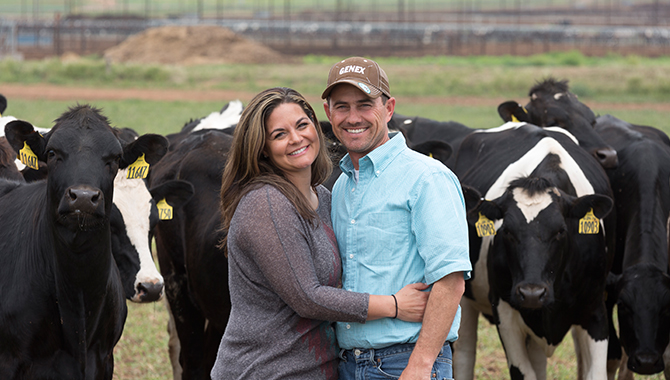Making our food system sustainable takes a commitment from all of us. As health professionals, we can help educate our patients on what farmers are doing – as well as on small changes we can all make – to help preserve our environment and feed our future.
Farm First
Our dairy farmers are committed to their land. They have a strong interest in the health of their environment for their families, communities and all the millions of people they help feed. Dairy farmers have a long history of responsible care for their animals and dedication to an environmentally sound food system. Their small changes have led to big results. Producing a gallon of milk today generates 60 percent less greenhouse gas than in it did in the 1940s. And our farmers are always focused on continuous improvement. Some of the most interesting innovations include:
- Dairy Power™ ‒ Partnerships between dairy farms, food processors and retailers that turn food waste and cow manure into products like renewable energy, biogas, fiber and fertilizer through anaerobic methane digester systems.
- Farm Smart™ ‒ A program that helps dairy farmers optimize their production techniques, identify potential improvements in management practices and further reduce their environmental impact.
- Farm Energy Efficiency™ ‒ A program designed to help farmers reduce energy use and make their entire farm more energy-efficient.
Learn more about our farmers’ innovations. Discover a few sustainability all-stars.
On Your Fork
One of the biggest problems we can tackle is food waste. An estimated 30-40 percent of food in the United States is wasted every year. That’s more than 36 million tons of food sitting in landfills producing greenhouse gas emissions. That’s also food that could be going to more than 49 million food-insecure people in the United States. As health professionals, we can help reduce waste by educating our patients on how to shop smarter to continue that sustainability commitment from the farm to the table. Here are my three favorite tips:
- Shop the refrigerator first. Cook and eat what you have at home before you head to the grocery store. It helps with waste and helps save a few dollars too.
- Plan ahead. Meal planning is a great way to make sure you use up everything you buy.
- Donate what you don’t use. Nutritious, safe and untouched food can be donated to local food banks.
There are more great tips out there, and more great ideas to come in the future. As long as all of us make a commitment to improving what we can, a sustainable food system is in our future. Learn more about how our dairy farm families support a healthy planet.




